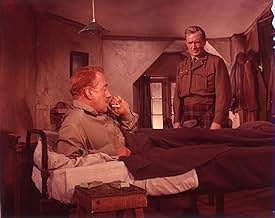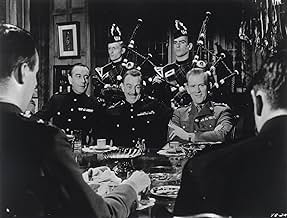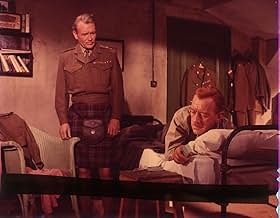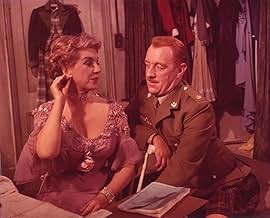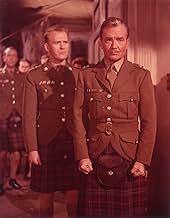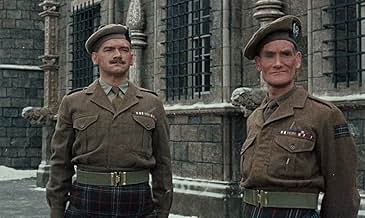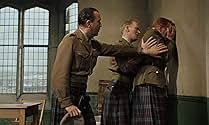Após a Segunda Guerra Mundial, o Comandante em exercício do Regimento das Terras Altas, que subiu das fileiras, é substituído por um Comandante educado em Oxford, em período de paz, levando ... Ler tudoApós a Segunda Guerra Mundial, o Comandante em exercício do Regimento das Terras Altas, que subiu das fileiras, é substituído por um Comandante educado em Oxford, em período de paz, levando a um conflito dramático entre os dois.Após a Segunda Guerra Mundial, o Comandante em exercício do Regimento das Terras Altas, que subiu das fileiras, é substituído por um Comandante educado em Oxford, em período de paz, levando a um conflito dramático entre os dois.
- Indicado a 1 Oscar
- 2 vitórias e 7 indicações no total
Avaliações em destaque
Sadly, for him, his informal barracks is going to be reformed under the auspices of the public school via Sandhurst graduate Lt. Col. Basil Barrow (John Mills) who believes in doing all things by-the-book. This sets the scene for a post WW2 power battle under a grey Scottish winter sky.
When writing a review of any excellent film - such as this - you are frightened you are going to put people off by its limits. However this is a classic example of less really being more. The claustrophobic atmosphere and the sense that armies without wars are prone to be heavy with politics. Not unlike like prisons: To many people in the same space with too much time on their hands. They drive men mad and extend the worst in the human character.
Guinness and Mills are fantastic actors. Oscar winners both and more. They could read the phone book and captivate an audience. For the record they had both seen war service, although Mills baby face and short stature had made him the butt of many jokes (many he was happy to re-tell). Did this help form his character? The guy who was laughed at and therefore worked even harder to enforce discipline or gain respect. This is, naturally, speculation.
I have no the knowledge of author (of book and film) but just by watching you know he has seen it for real. The little details that only the insider would know. The story would just as well be served as a theatre piece and it employs some its stock devices. The accidental narrator being the more obvious. Maybe this was to save money, but it would not have helped the picture to see - say - the incident that Mills had to endure from the Japanese.
Eyewitness testimony from the filming says that Guinness thought he would look silly in a kilt and used fake tanner on his pale legs. He is not the biggest of men and has to stick out his chest and stand on tiptoe to be imposing, but you do believe him. What an actor he was. An actor's actor. Like Peter Sellars, totally bland out of character (and not always very nice as he writes in his various autobiographies) but always mesmeric on screen. Mills - on the other hand - could never work as a bad guy. The perfect uncle figure who you would want to confide in.
(I am maybe giving the support cast short-shrift - but most British films of the time had quality character actors. No exception here. Amazing to see Susannah York in her first role.)
Alfred Hitchcock himself said Tunes of Glory was his own personal favourite film. It is not quite mine, but a great demonstration of how brilliant film can be when top class actors get their teeth in to a wonderful script. The end is pure Shakespeare. Don't watch it once, watch it twice...
I am not as enamored of "Tunes of Glory" as I am of, say, "Bridge on the River Kwai," but it is without question a powerful movie. The conflict between Sinclair and Barrow is palpable; I think, in particular, of Mill's violently trembling rage during the dancing scene, and Guinness's dismissive ridicule of Barrow's deepest confidences ("toy soldiers!") during his attempt to con him into clemency. Sinclair's grief-stricken collapse at the end is truly an unforgettable scene and a tribute to Guinness's power.
Working from a tight, intelligent screenplay by James Kennaway (adapted from his own novel), Neame delivers a taut, insightful character driven drama that explores the diversity of human nature, and illustrates the good and evil contained within us all and the traits which ultimately determine which will be the prevalent manifestation of the individual personality. Through the device of placing the protagonist and the antagonist-- each the antithesis of the other-- in a no-win situation, the film examines motivations, actions and reactions that can lead the story in any number of directions, none of which are positive, but all of which are logical and which finally leads to a conclusion that is extremely powerful, incisive and totally believable.
As Jock Sinclair, you see Alec Guinness in a role quite unlike anything else he's ever done; it was, in fact, his own personal favorite of all of his cinematic creations. Sinclair is a man who is course and rough-hewn, an egoist who, when the personal need arises, will wantonly subject those around him to psychological cruelty in order to elevate himself and his position and to assuage his own ego. At mess, for example, he derides a young officer for not smoking his cigarette like a man; he orders every `man' to drink whiskey, implying that to do otherwise constitutes an assessment of an individual's masculinity. Boisterous bravura and ribald behavior are his tools of navigation through life, coupled with an attitude of doing things his way or the wrong way. And Guinness plays it to the hilts. Beginning with his whole perspective and attitude, he IS Sinclair, while physically he embodies and expresses exactly who this man is and what he stands for. At times, his eyes fairly bulge with an enthusiasm that suggests a lasciviousness underlying the cruelty; when he walks he strides purposefully, and carries himself in such a way that when he enters a room he veritably fills it and makes his presence felt so that the very air seems oppressed by him. It's a performance that, even in a strong year of Oscar contenders (Trevor Howard, Lancaster, Lemmon, Olivier and Tracy were all up for Best Actor-- Lancaster won) he deserved to be among them. In this film Guinness is quite simply unforgettable in one of his most powerful roles.
John Mills, as well, delivers a superb, introspective performance as Barrow, capturing the way in which this man must live so inwardly to survive, and conveying how difficult it is for him to continue on while attempting to live up to his heritage and the expectations of a position to which he is clearly unfit in his current mental state. In Barrow we see reflected the prevailing attitude of the times that `might makes right,' and that anything less is akin to unacceptable negligence, that same military mind-set that put Jake Holman at odds with the world in `The Sand Pebbles,' and led to the unfortunate incident depicted so eloquently in `A Few Good Men.' It's an excellent, understated, sensitive performance by Mills, who plays brilliantly off of Guinness's brutishness.
The film also boasts a number of excellent supporting performances, especially Dennis Price, as Major Charlie Scott, whose stoic assessment of himself as well as the situation at hand serves as the film's conscience; Gordon Jackson as the sympathetic Captain Jimmy Cairns; and Duncan Macrae in a memorable turn as Pipe Major Duncan MacLean.
Also included in this outstanding supporting cast are Kay Walsh (Mary), John Fraser (Ian), Susannah York (In her film debut as Morag Sinclair), Percy Herbert (Riddick), Allan Cuthbertson (Eric) and Angus Lennie (Orderly). A powerful film that so successfully demonstrates the devastating effects of dysfunctional human relationships and conveys the need to look beyond ourselves, `Tunes of Glory' presents a story to which everyone will be able to relate because the theme is applicable to any setting involving human interactions. A thoroughly involving film featuring a number of memorable performances (especially by Guinness) that will give you reason to take pause and reflect, and hopefully add some perspective to a world too often mired in unnecessary turmoil. I rate this one 10/10.
Guinness plays an angry and blustering Scottish officer who may also be an alcoholic (he at least is a problem drinker and shows many signs of alcoholism). The film begins with this popular officer throwing a farewell party, of sorts, with the men in his command. It seems that Guinness was given temporary command but a replacement (John Mills) is due to arrive shortly--dashing Guinness' hopes for this position becoming permanent.
Because Guinness' character is so very flawed and petty, he does much to try to undermine the new C.O.. In particular, Mills is a "by the book" sort of officer and Guinness ignores changes Mills orders--and by example, derision and a lack of respect for Mills spreads through the ranks. Instead of behaving like officers and gentlemen, the men behave like this is some sort of popularity contest and they show contempt for their new leader. None of this is helped by Guinness' drinking, as it gets him in trouble and creates serious problems for the regiment.
While Mills, as usual, does a great job in the film playing a man who is suffering from Post-traumatic Stress Disorder, the film is definitely Guinness'. His boorish character is a great example of him once again immersing himself into a character and the way he responds to the tragedy near the end of the film gives the character great depth and a bit of sympathy--something you needed to make this a stand-out film.
The bottom line is that this film is extremely well-crafted. The acting is universally excellent, the script tense and well-written and the film is great unless you are the type of person who demands lots of action. While a film about the military, this is no action film. Wonderful.
Você sabia?
- CuriosidadesSir Alec Guinness was offered the role of Lieutenant Colonel Barrow, but asked for the role of Major Sinclair instead. He then suggested Sir John Mills for the other role.
- Erros de gravaçãoPipe Major MacLean is never shown with a set of bagpipes. In particular, he is a mere observer at band practice. A pipe major is not only the leader of the band but also its chief instructor, and it is unthinkable that he would not play an active role in all practices.
- Citações
Major Jock Sinclair, D.S.O., M.M.: We're on a first name basis in this regiment. Your first name is Derek. My first name is Major.
- ConexõesFeatured in Film Extra: Alec Guiness (1973)
Principais escolhas
- How long is Tunes of Glory?Fornecido pela Alexa
Detalhes
- Data de lançamento
- País de origem
- Idioma
- Também conhecido como
- Tunes of Glory
- Locações de filme
- Stirling Castle, Stirling, Escócia, Reino Unido(establishing shots)
- Empresas de produção
- Consulte mais créditos da empresa na IMDbPro
- Tempo de duração
- 1 h 47 min(107 min)
- Cor
- Proporção
- 1.66 : 1


